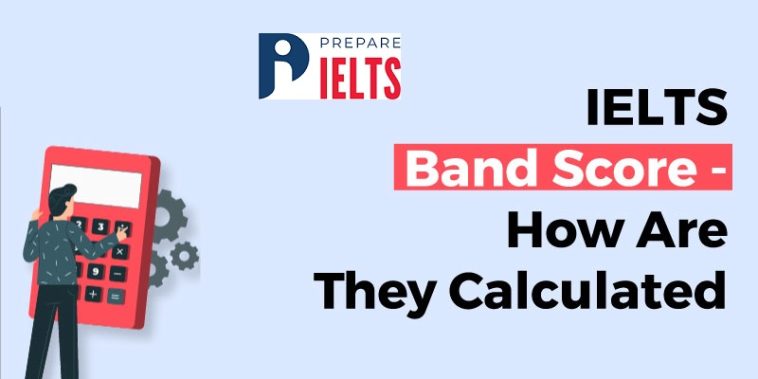The IELTS Test Report Form provides a comprehensive breakdown of your performance in the 4 distinct sections of the IELTS, along with your overall band score.
The IELTS exam report offers you a detailed view of their achievements, enabling a thorough understanding of your language proficiency across listening, reading, writing, and speaking, in addition to your consolidated IELTS band score.
How are IELTS scores calculated?
The IELTS assessment process involves four distinct components: Listening, Reading, Writing, and Speaking, each carrying equal weight in the evaluation. These components are scored individually on a scale ranging from 0 to 9, with intermediate increments of 0.25, 0.5, and 0.75.
The overall IELTS band score, which summarizes a test-taker’s language proficiency, is calculated by determining the mean result across all four components. This involves summing the individual scores for each section and then dividing the total by four.
To ensure fairness and precision in the assessment process, the calculated overall band score is rounded to the nearest whole or half band. Specifically, scores ending in .25 are rounded up to the next half band, and scores ending in .75 are rounded up to the next whole band.
This rounding practice is crucial as it maintains accuracy in the evaluation and aligns with the established IELTS band score scale. It ensures that test-takers receive a fair and representative assessment of their language abilities, allowing them to better understand their proficiency level and facilitating comparisons with the Common European Framework of Reference for Languages (CEFR) and other language assessments.
What do IELTS scores show?
Head over to what each IELTS band score means in terms of your skill level including each of its descriptions or narrative for student’s understanding.
Band 9 – Expert User
Reaching band 9 means you are an expert English user and your command of the language is exceptional. You express yourself fluently, accurately, and appropriately in English, demonstrating a thorough comprehension of the language. Your communication is flawless, showcasing a high level of proficiency and comprehension.
Band 8 – Very Good User
Acquiring band 8 means you are a very good English user and possess a strong command of the language, with occasional, sporadic inaccuracies and instances of inappropriate language usage.
While you may occasionally misunderstand unfamiliar contexts, your ability to engage in complex, detailed discussions remains impressive.
Overall, your language skills are proficient, allowing you to effectively communicate and engage in nuanced conversations, despite infrequent errors and occasional challenges in new situations.
Band 7 – Good User
Achieving band 7 means your command of the language is operational, but there are occasional inaccuracies, inappropriate usage, and misunderstandings, particularly in unfamiliar situations.
Despite this, you can generally navigate complex language effectively and grasp detailed reasoning with a reasonable level of comprehension.
Band 6 – Competent User
Getting band 6 means you are a competent user and your command of the language is generally effective, although there are occasional inaccuracies, inappropriate usage, and misunderstandings.
You can competently use and comprehend fairly complex language, especially in familiar contexts, demonstrating a reasonable level of proficiency.
Band 5 – Modest User
Band 5 means you are a modest English user and your grasp of the language is limited, and while you can generally convey the overall meaning in most situations, numerous errors are likely to occur.
In your specific field, you should manage basic communication adequately. However, a significant number of mistakes may still impede clear and accurate expression.
Band 4 – Limited User
Limited English user as in band 4 refers to your proficiency being confined to familiar situations, where you demonstrate only basic competence. So, you often encounter difficulties in both comprehension and expression.
Complex language remains beyond your ability, and you frequently struggle with understanding and conveying ideas. In more challenging or unfamiliar contexts, your limitations become apparent, making it challenging to navigate and communicate effectively.
Band 3 – Extremely Limited User
Band 3 means your ability is limited to conveying and comprehending only basic concepts in highly familiar settings. Communication often breaks down due to frequent misunderstandings and difficulties in expressing more complex ideas or information.
Band 2 – Intermittent User
Band 2 simply means you face significant challenges in comprehending both spoken and written English.
Understanding the language is notably difficult, and you may struggle to grasp the meaning of English content, whether spoken or in written form, due to language barriers or limitations in your language skills.
Band 1 – Non-user
Your language proficiency is extremely limited, and you can only muster a few isolated words. You lack the capability to construct coherent sentences or engage in meaningful communication, rendering your language skills nearly non-existent.
IELTS and the Common European Framework (CEFR)
The Common European Framework of Reference for Languages (CEFR) serves as a globally recognised standard for assessing and describing language proficiency. It categorises an individual’s language skills into six levels, ranging from A1 for beginners to C2 for advanced learners.
In the context of IELTS, achieving an IELTS band score list of 9 signifies the highest CEFR level of language proficiency. Using the CEFR framework allows educators and students to align IELTS scores with a broader language competency scale. This mapping aids students in understanding their language abilities more comprehensively.
CEFR provides a clear reference point for learners to assess their strengths and areas for improvement within the context of their IELTS scores. Moreover, its rankings enable educators, examiners, and institutions to compare IELTS performance and results from other language tests and qualifications.
So, this cross-referencing assists in understanding how IELTS proficiency aligns with other language assessments, facilitating international mobility and academic or professional recognition.
Ultimately, the CEFR framework plays a vital role in promoting transparency, consistency, and comparability in language assessment, benefiting both students and stakeholders in the field of language education and evaluation.
IELTS Band Score
CEFR Level
9
C2
8.5
C1
8
C1
7.5
B2
7
B2
6.5
B2
6
B1
5.5
B1
5
A2
4.5
A2
4
A1
3.5
A1
3
A1
2.5
A1
2
A1
1.5
A1
1
A1
Conclusion
To conclude, IELTS band scores are vital for assessing language proficiency in listening, reading, writing, and speaking. Aligned with the CEFR, they offer a global benchmark. These scores help individuals recognize strengths and weaknesses, aid educators, and ensure transparency in language evaluation for academic and professional purposes.




